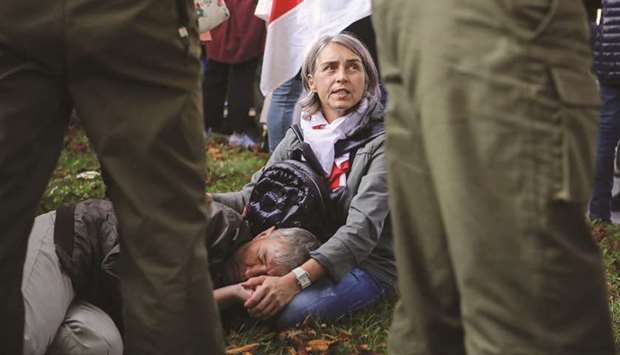Riot police in Belarus bundled hundreds of women, including a great-grandmother who has become an icon of the protest movement, yesterday into vans as opposition marchers rallied in Minsk seeking an end to President Alexander Lukashenko’s 26-year rule.
The protest was the latest in which Belarusian women have taken to the streets with flowers and flags.
The numbers detained yesterday were far higher than the previous week’s rally.
The women were seized by riot police in black uniforms and balaclavas as well as officers in khaki uniforms and plain-clothed officers in face masks.
Police blocked the women and began pulling them into police vans as they stood with linked hands, swiftly detaining hundreds, an AFP journalist saw.
Police lifted some women off their feet in order to remove them.
The Viasna rights group published online the names of 328 women detained, while police spokeswoman Olga Chemodanova told AFP that the number detained would be announced today.
Police detained so many protesters that they ran out of room in vans, the opposition’s Co-ordination Council said.
Around 2,000 women took part in the “Sparkly March”, wearing shiny accessories and carrying red-and-white flags of the protest movement.
Among those detained yesterday was Nina Baginskaya, a 73-year-old activist who has become one of the best-known faces of the protest movement, known for her plucky antics and regularly celebrated with a chant of “Nina! Nina!”
Police took away the flag and flowers she was carrying as they pushed her into a van but released her outside a police station shortly afterwards.
The march was the latest in a series of all-women protests calling for the strongman to leave following his disputed victory in elections last month.
His opposition rival Svetlana Tikhanovskaya also claimed victory.
Tikhanovskaya, who has taken shelter in Lithuania, condemned the “arbitrary” detentions, saying that police officers without any identifying badges had “roughly detained en masse beautiful and brave women who were protesting lawfully and peacefully”.
The opposition’s Co-ordination Council, set up by Tikhanovskaya’s allies to arrange a peaceful handover of power, described the detentions as “a new phase in the escalation of violence against peaceful protesters”.
Tikhanovskaya warned that protesters were ready to strip riot police who carry out “criminal orders” of anonymity.
The Poland-based opposition Telegram channel Nexta published a list of more than 1,000 names and ranks of police offenders, saying that it received the data from whistleblowers and would post more if detentions continued.
Witness accounts of police violence and torture of detainees following the elections have prompted the European Parliament to call for sanctions against Lukashenko and other members of his regime.
The marchers chanted slogans such as “Get out, you and your riot police!” and “We believe we can win!”
One of the placards read: “Our protest has a woman’s face”, a reference to the title of a popular book by the Belarusian Nobel prize winner Svetlana Alexievich, who has backed the opposition cause.
“I will march to the end, until we claim victory, because we are in the right,” said one protester, Irina, a 50-year-old programmer.
Some of the women protesters managed to run away and took shelter in a nearby nail bar, Tut.by news site reported.
The protest came as the opposition was due to hold mass demonstrations this afternoon in Minsk and other cities.
Tikhanovskaya is set to meet European Union foreign ministers and the bloc’s diplomatic chief in Brussels tomorrow, in a move that Russian foreign ministry spokeswoman Maria Zakharova condemned as “flirting with a self-appointed representative of the Belarusian opposition”.
The women’s protests began in Belarus after Lukashenko’s use of extreme violence against detained demonstrators.
Women began forming human chains and marching through Minsk and other cities wearing white clothes and carrying flowers in peaceful demonstrations that police initially allowed to go ahead.
Last weekend, police violently detained several dozen at a similar women’s protest.
Lukashenko last week warned of a possible “war” with some neighbouring countries and has turned to Russia for support after refusing to step down.

A woman sits with a man lying on the ground near Belarusian law enforcement officers during an opposition rally in Minsk to protest police brutality and to reject the presidential election results.
